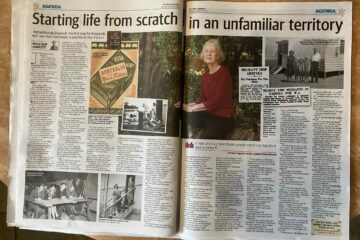
Rose van Bruinessen (later known as Rosemary Moodley) was one of the pioneering figures in Australian women’s football. Known as Matilda #10, she played a significant role as a defender in the foundational years of the Australian Women’s National Football Team — now world-renowned as the Matildas.
Rose was born in Sydney, but both of her parents were Dutch migrants. Her father, Jan van Bruinessen, was born in Utrecht, and her mother, Truus van Bruinessen, came from Amsterdam. Their migration to Australia formed part of the broader postwar wave of Dutch families seeking opportunity and a new life. Rose’s mother had neen imprisoned in a Japanese camp on the Nether Lands East Indies )now Indonesia).That heritage — a blend of Dutch discipline and resilience — would later be visible in Rose’s calm, commanding style on the pitch.
Rose began playing football at the age of 12, starting out at Crest Soccer Club in Sydney’s inner west. Although Crest was unaffiliated with the official governing body at the time, it provided Rose with the foundational coaching and environment to hone her skills. Under the guidance of coach George Thomas, she developed a reputation as a composed and powerful defender. Eventually, she moved to Arncliffe Scots, a registered club, to continue her development and access higher levels of competition.
In 1979, Rose made history as a member of the first official Australian Women’s National Football Team. She debuted in an international match against New Zealand at Seymour Shaw Park in Miranda, NSW. Over the next five years, she earned 14 caps for Australia, holding a key role in the defensive line from 1979 to 1984. Described as tall, athletic, and technically sound, Rose was known for her aerial dominance and her calmness under pressure — attributes often admired in the Dutch style of football.
Rose was not the only Dutch-Australian on the national team during that era. She shared the field with Renaye Iserief, another player of Dutch descent. Together, Rose and Renaye represented the early multicultural identity of the Matildas — long before Australia became known for its football diversity.
Rose’s football legacy goes beyond her years on the pitch. She has remained engaged with the Matildas’ alumni community, advocating for the recognition of the team’s pioneers and supporting the growth of women’s football in Australia. She was present at milestone events, including the Matildas’ victory over Brazil in Newcastle in 2017, a moment that symbolised how far the team had come from its humble beginnings.
Today, Rose van Bruinessen’s story is not only that of a sporting pioneer, but also a reflection of the Dutch-Australian migration experience — one that blended cultural integration with sporting excellence, and helped shape the foundations of women’s football in this country.
See:


